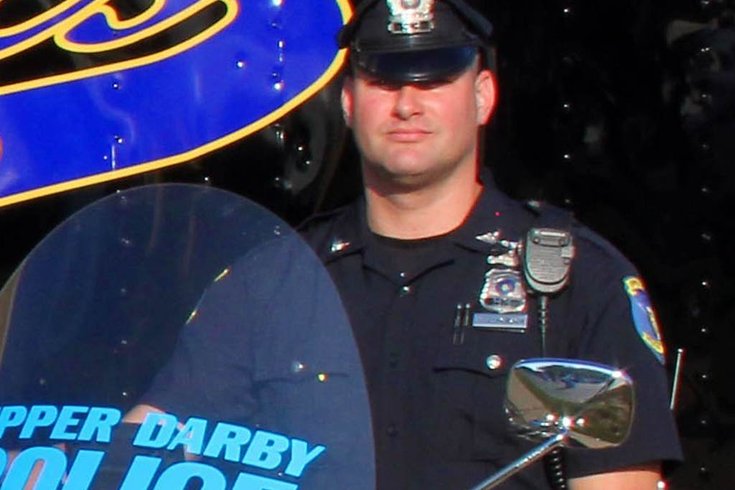
May 20, 2016
 Photo courtesy/Upper Darby Police Department
Photo courtesy/Upper Darby Police Department
Upper Darby police Officer James Hoback, 31, a six-year veteran, defused a potential suicide-by-cop situation on Wednesday on Garrett Road, the latest incident that gave him an opportunity to use the mediation skills he learned in the Delaware County Crisis Intervention program.
An Upper Darby patrolman and former U.S. Marine put his crisis intervention expertise to the test on Wednesday to save the life of a troubled Drexel Hill man.
Officer James Hoback, 31, a six-year veteran, was first on the scene about 5:30 p.m. Wednesday to an apartment building on the 3800 block of Garrett Road, responding to a 911 call for a man with a knife threatening suicide.
“The 20-year-old male was sitting on the couch in the living room holding a butcher knife to his throat,” police Superintendent Michael Chitwood said. “He was emotionally disturbed and kept saying his life was over and there were no other options. His initial intention was ‘suicide by cop.’ That didn’t happen, because instead of police storming into the apartment Hoback was able to resolve the situation. He was able to talk to him, got him to calm down and walk out of the apartment. Hoback did an outstanding job.”
Hoback, one of 18 officers from seven police departments who graduated from the first Delaware County Crisis Intervention program in 2012. Study topics included the Mental Health Procedures Act, crisis intervention, engaging the homeless, veterans’ services and suicide by cop.
The officer put his training to the test at the scene, something he has done several times before in the township since attaining certification.
“This guy had a knife and a caseworker was there,” Hoback said. “He had been suffering for some time. I was the first one in but I just waited outside the door until other officers arrived. There were three of us there. I opened the door to the apartment and he was on the sofa holding a knife.
“I just said, ‘Talk to me, bud.’ I was trying to get him to talk and keep him talking. The training gave us different tactics for crisis situations and if you have them talking there is progress. It gets their attention and off what else they are planning to do.
“It helps me to build a rapport so the chances of a positive outcome are good," he recalled. "I talked to him at least 15 minutes and kept thinking what else can I say or do to keep him distracted.”
According to Hoback, patrol Officers Steven Russo and Steven O’Connor responded to the call and served as backup.
“They were watching my back so I re-holstered my weapon so he could look at me as the least threat,” Hoback said. “On Garrett Road I had guys I trust with me. I knew they all had my back and at no point did I feel fear. It’s a tense situation and could get ugly real quick if he charges at us. I couldn’t do what I do without the other guys. They were there for me and we were all there for him. He actually ended up talking to me. He said later the reason he dropped the knife was because of something I said to him made him stop and think.
“I told him ‘I can’t go home to my wife and four children without giving you a fighting chance.’ I try to relate to people and find a way to connect and that connected with him. I was able to keep his attention on me and not on his plan. We are always looking for a good outcome and got him out of there and kept everybody safe. It all turned out nice and it was a pretty good feeling.”
According to Hoback, the victim didn’t see any way out of his situation, citing a relationship gone sour, his child and his employment status.
The officer assured him a final solution to a temporary problem was not the answer.
Chitwood has had half of the police department, 65 officers, attend and be certified at the Crisis Intervention training program.
“My goal is to have all of my officers trained,” Chitwood said. “Proper communication enhances the outcome of encounters with members of the community. Nowhere is this more pronounced than in situations where police officers interact with persons who have mental illness or going through a mental health crisis. The Crisis Intervention Team training is a powerful tool that the law enforcement community can utilize to interact effectively and safely with persons who have mental illness.”
The man on Garrett Road was transported to Mercy Fitzgerald Hospital Crisis Unit, Darby, for evaluation and care.